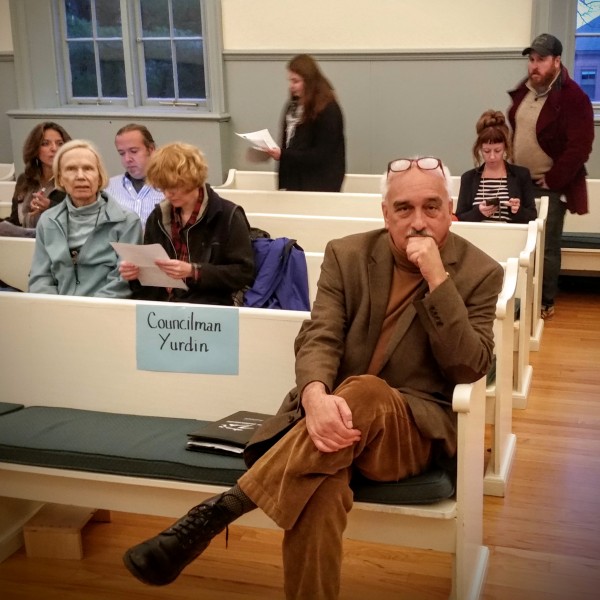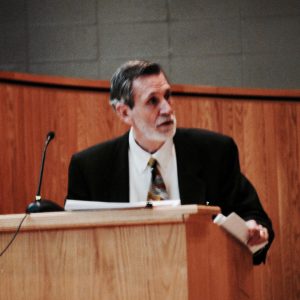
Wednesday night’s Burrillville Town Council meeting hearkened back to the early days of public opposition against Invenergy’s $700 million fracked gas and diesel oil burning power plant planned for the town. Back then, we saw a public that was distrustful of the town council, and a town council that was not receptive to the idea of opposing the power plant, early on claiming to be powerless against the combined might of Invenergy, Governor Gina Raimondo’s office and regulators.
The town council then took the position, contrary to the Open Meetings Act, that people in the town were only allowed to talk about issues and subjects that were specifically listed on the town council’s agenda, cutting off discussion about the Algonquin pipeline if the power plant was on the agenda, or vice versa. In December of last year, calls from the town council to trust them elicited groans of dismay from the audience.
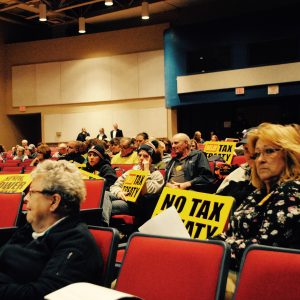 Then, in April of this year, it was learned that the town council had been in secret negotiations for a tax treaty with Invenergy for months. The town council was still forcing residents to only speak about “agenda items” and working hard to curtail public discussion, contrary to the Open Meetings Act. The growing resistance in Burrillville to the power plant felt disempowered. Not only were they fighting a multi-billion dollar power plant company funded by a Russian oligarch, they were fighting both the state and local governments. The fight seemed impossible and trust between the town council and residents couldn’t be worse. Or so they thought.
Then, in April of this year, it was learned that the town council had been in secret negotiations for a tax treaty with Invenergy for months. The town council was still forcing residents to only speak about “agenda items” and working hard to curtail public discussion, contrary to the Open Meetings Act. The growing resistance in Burrillville to the power plant felt disempowered. Not only were they fighting a multi-billion dollar power plant company funded by a Russian oligarch, they were fighting both the state and local governments. The fight seemed impossible and trust between the town council and residents couldn’t be worse. Or so they thought.
At an April 14 town council meeting Council President John Pacheco said that the town council learned about Invenergy’s plans when everyone else did, during a press conference held by Governor Raimondo announcing the plant, saying, “As a town council, we did not know this plant was actually going to happen until the Governor announced it.”
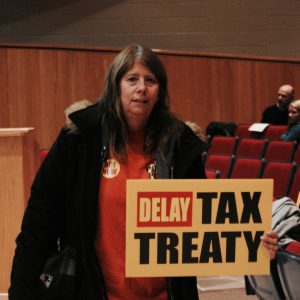 This turned out to be inaccurate. Videos of town council meetings from February and March of 2015, on the town council’s own website, showed the town council and state legislators paving the way for the controversial Invenergy power plant months before the governor officially announced the project. Over time some of the details about how Invenergy approached the town came to light, but the complete story, and who opened what doors to the power plant, has yet to be revealed.
This turned out to be inaccurate. Videos of town council meetings from February and March of 2015, on the town council’s own website, showed the town council and state legislators paving the way for the controversial Invenergy power plant months before the governor officially announced the project. Over time some of the details about how Invenergy approached the town came to light, but the complete story, and who opened what doors to the power plant, has yet to be revealed.
The town council eventually came to a public position regarding the power plant: The town council would put on a public display of strict neutrality, taking no position for or against the power plant, until after all the advisory opinions from various town boards had been completed. This was so as to appear to not influence the outcomes of the various advisory opinions and give the Energy Facilities Siting Board (EFSB) a reason to suspect that the opinions might be slanted in some way.
 State legislators Cale Keable and Paul Fogarty went a different route. They entered legislation at the state level that if passed, would give voters in Burrillville the ability to approve or reject any tax treaty negotiated between the town council and Invenergy.
State legislators Cale Keable and Paul Fogarty went a different route. They entered legislation at the state level that if passed, would give voters in Burrillville the ability to approve or reject any tax treaty negotiated between the town council and Invenergy.
The bill passed the House and was due for consideration and a vote in the Senate when the town council passed a resolution in opposition to the Keable Bill at the 11th hour, giving the Senate Judiciary Committee enough of a reason to vote down the bill. The relationship between the town council and residents was now overtly acrimonious. There were tears from Town Councilor Kimberly Brissette Brown and anger and accusations from Town Councilor Donald Fox. Residents spoke of feeling “humiliated” at the State House as the press release announcing the resolution was sprung on them by Senators Frank Lombardi and Steven Archambeault, who treated the residents with risible condescension.

Since that low point, the town council and residents worked to rebuild trust. Residents by this time were long past being held to arbitrary and incorrect readings of the Open Meetings Act. They spoke their minds, expressed their concerns and the town council, to their credit, finally seemed to be listening. They seemed to come together as a town when Governor Gina Raimondo visited to hear resident concerns about the power plant.
After the lengthy process of creating the advisory opinions concluded, the town council passed an extremely robust resolution opposing the power plant and asked other city and town councils in and around Rhode Island to join them in opposition. Many already have and many more are considering joining Burrillville in opposition to the plant. But the Burrillville Town Council’s opposition came with a caveat: They still planned to sign a tax treaty with Invenergy, a tax treaty that the town residents want to hold off on signing.
At issue is the timing. The town council maintains that they have negotiated a solid tax treaty that will protect the town in the event the power plant is built, and guarantee a steady stream of income to the town. The residents want to wait until after the EFSB decides on Invenergy’s application before signing any treaty. Right now, the power plant’s application is suspended, pending Invenergy’s search for a new source of water. Signing the tax treaty, say residents, gives Invenergy extra leverage in negotiating a deal with another municipality, like, let’s say, Woonsocket, to purchase water. The town’s opposition to the power plant must be unified and consistent. Opposing the power plant with a resolution sends one message, signing a tax treaty with Invenergy sends another.
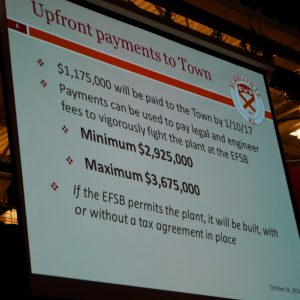 At Wednesday night’s hearing, Attorney Michael McElroy, who negotiated the tax treaty, said that the opposing the power plant and signing a tax treaty were not inconsistent actions and would not be seen that way. “I want to make it… clear that I see no inconsistency between entering into these agreements and dead set opposition to the plant,” said McElroy.
At Wednesday night’s hearing, Attorney Michael McElroy, who negotiated the tax treaty, said that the opposing the power plant and signing a tax treaty were not inconsistent actions and would not be seen that way. “I want to make it… clear that I see no inconsistency between entering into these agreements and dead set opposition to the plant,” said McElroy.
But McElroy is a lawyer. He is not a business man trying to buy water to cool a power plant. What businessman wouldn’t mention the tax treaty as proof that the town council is actually okay with having the power plant sited in their town? The resolution in opposition will be described behind closed doors as merely political theater, something to satisfy the rubes while the real business of government is imposed by the movers and shakers in secret meetings paid for with political contributions.
McElroy did his best to sell the tax treaty to the residents. He spent 45 minutes outlining the deal, expressing the need for a treaty. One reason McElroy gave, that didn’t sit well with residents, was that, “I want to get paid.” The money generated by this tax treaty will give the Town of Burrillville the money it needs to fight the siting of the power plant all the way to the Supreme Court, if need be. The lawyers and experts needed to fight such a case cost money, said McElroy, who included himself in those expenses.
McElroy suggested that if the town council did not pass the tax treaty, Invenergy might pull it off the table. He assured the audience that contrary to what Conservation Law Foundation senior attorney Jerry Elmer says, the plant will be built without a tax treaty in place.
Residents weren’t buying it. Towards the end of what turned out to be a five hours plus meeting, it was obvious that the town’s people were not willing to drink the tax treaty Kool-Aid. Forty people spoke against passing the tax treaty. Two spoke in favor of trusting the town council and McElroy’s advice.
Ultimately the town council recessed without doing anything on the tax treaty. There is a plan to take up the issue again next week.
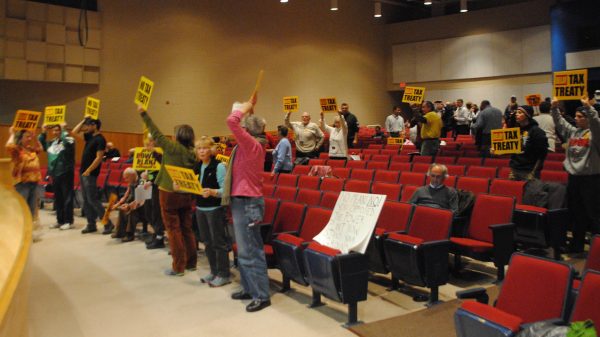
 The FANG Collective staged a demonstration outside TD Bank Wednesday to protest the company’s support of the Dakota Access Pipeline (DAPL), which is even now being blocked by First Nation protesters from many different tribes. TD Bank is one of many lending institutions financing the pipeline.
The FANG Collective staged a demonstration outside TD Bank Wednesday to protest the company’s support of the Dakota Access Pipeline (DAPL), which is even now being blocked by First Nation protesters from many different tribes. TD Bank is one of many lending institutions financing the pipeline.
 This protest follows an action last week in which two protesters locked themselves down in the bank’s lobby and had to be removed by police. Wednesday’s action, which was publicly announced on Facebook, drew a Providence Police detail, but the entire affair was very low key, and no arrests were made.
This protest follows an action last week in which two protesters locked themselves down in the bank’s lobby and had to be removed by police. Wednesday’s action, which was publicly announced on Facebook, drew a Providence Police detail, but the entire affair was very low key, and no arrests were made.
 Protesters handed out flyers and held signs. One woman, Amy, after hearing from protester Sally Mendzela about the bank’s involvement with DAPL, told me that though she had come to open an account with the bank, she was not. Mendzela said that the woman was the second person to be dissuaded from doing business with TD Bank since she arrived.
Protesters handed out flyers and held signs. One woman, Amy, after hearing from protester Sally Mendzela about the bank’s involvement with DAPL, told me that though she had come to open an account with the bank, she was not. Mendzela said that the woman was the second person to be dissuaded from doing business with TD Bank since she arrived.
Meanwhile, tensions remain high between the “water protecters” and DAPL developer Energy Transfer Partners. Tribes are invoking their treaty rights even as the developer threatens arrests and even violence. As reported by Mary Annette Pember, “the Morton County Sheriff’s Department backed by North Dakota Governor Jack Dalyrmple continued to ratchet up displays of military-style police force.”
The video below, published by Jennifer Minor on October 25, shows police using pepper spray before arresting protesters.
https://www.youtube.com/watch?v=066h12rmcDQ

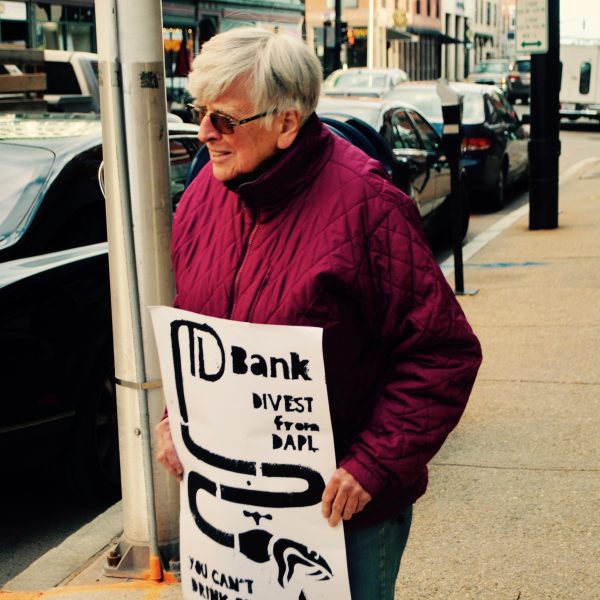
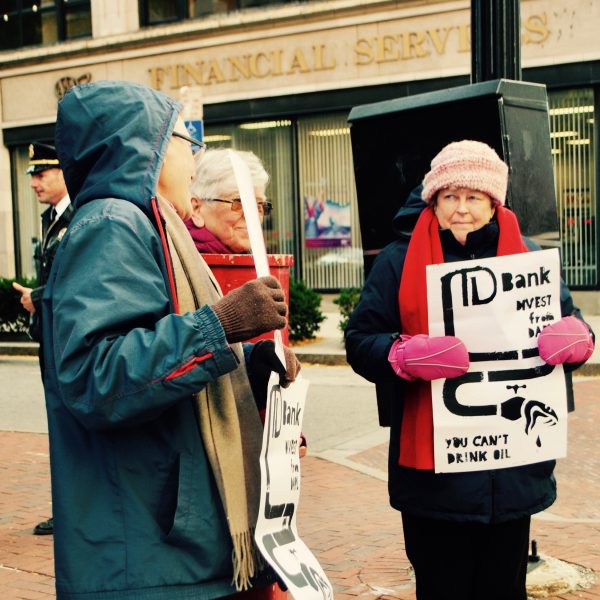
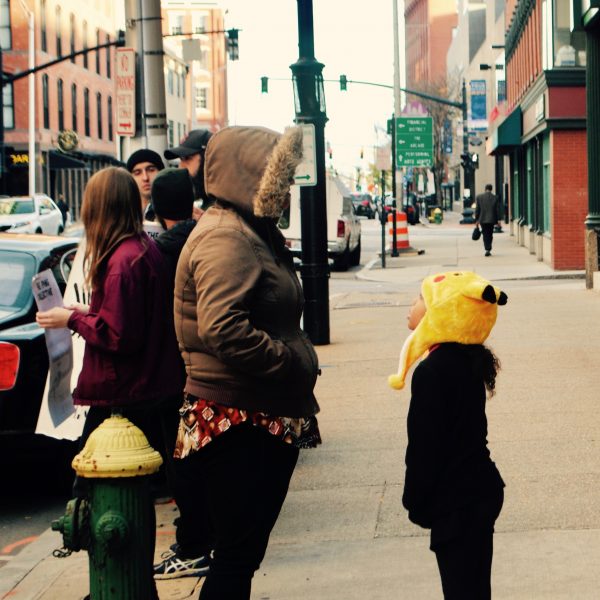


On October 23 RI state co-coordinators Emilia DaSilva-Tavarez and I organized a rally in support of the anti-bullying Healthy Workplace Bill S2377, which was introduced last March 2015 by Senator Frank Ciccone.
The rally was held in Roger Williams National Memorial Park on North Main street in glorious weather. There were people standing on North Main holding “STOP WORKPLACE BULLYING” signs and handing flyers thru car windows and to pedestrians while engaging them in conversation to either hear their stories of being bullied in the workplace or educating them on what we and others in every state are trying to accomplish.
One of the people most instrumental in inspiring and showing the ropes to us, Debra Falzoi, a Massachusetts co-coordinator for the Healthy Workplace Bill, came down to join the protest with us.
The younger people in the group made colorful “STOP BULLYING” T-shirts and wore them as they handed out flyers to passersby.
Andrew Winters and his husband Don Smith traveled to be with us to lend us their most important support. Andrew has had his story published in RIFuture. I highly recommend that people read it to see what depths people will go to in the showing of abject unwarranted cruelty of unimaginable levels.
Often people are isolated to be better attacked and threatened by the bully – one cannot simply argue with their boss without fear they’ll be labeled insubordinate and people cannot do their work and, without proper training OR involving HR, confront a hostile coworker. People are forced to go out on medical leave for ulcers, migraines, heart ailments and more to get time to figure out the most feasible action to take. They and their negatively impacted families must do what’s best financially, in terms of a search for the next job, in terms of what will best protect the fragile health they have sunk to and more. It is a tightrope not easily walked. None of them knows how or if they’ll get a next job when they come to realize they may have PTSD from their experience.
Also, once isolated, the target of bullying is often forced to withdraw from a society that is slow to understand what has happened in our work and money driven culture to come to grips with what has happened, sometimes feeling unreasonable shame that this happened to them along with intense fear that they will be further harmed and retaliated against if they say or do anything.
In a lot of ways, workplace bullying mirrors child abuse and domestic violence – they are all forms of bullying. “If you tell anyone, I’ll kill you.”
Humanity needs to evolve past this barbarity. What can happen to one can eventually and has been proven to happen to all. We must learn to care for one another, not go after each other with bared teeth.
Workplace bullying can take many forms but primarily it is a harsh unwarranted attack on any employee with the intent of inflicting harm thru cruel acts, words, exclusion, gas-lighting (encouraging the employee to believe that they are incompetent), work sabotage, lies, false accusations and more to cause the targeted employee to want to leave their job. Usually the brightest, most talented, high performing employees are targeted because a manager or coworker is threatened by their capabilities and they want to force that employee to quit.
People have actually been physically threatened, accosted and had death threats made against them.
It is never the fault of the targeted employee that they are so treated.
The targeted employee suffers health and emotional harm which can be irreversible depending on the length and type of attack. The work of the employee and therefore of the company suffers. Companies allowing and encouraging this behavior lose their most talented employees and will not be able to get talent to join them as word gets out using such agencies as Glassdoor and even Monster. People are becoming more and more aware of the existence of this problem, but more are needed to be made aware.
Currently there are no protections against this kind of unwarranted, malicious attack.
There are laws against sexual harassment and harassment of employees having protected status but workplace bullying can happen to anyone of any age, either gender, sexual orientation, race and or religious preference. There is currently no protection, workplace policy or legal recourse for anyone suffering this type of abuse.
People do commit suicide after being horrifically bullied and, we believe, engage in workplace violence that is never investigated as to what the violent employee had to endure before they “went postal.” They are only portrayed on the news as either a criminal or mentally ill. We have FOIA requests to help us make that link between workplace bullying and suicide (“bullycide”) and/or workplace violence which often ends in the suicide of the perpetrator.
At the rally, there were many cars honking in support and giving many thumbs up. A couple from Connecticut stopped when they saw our signs, wanting information on how they could help there.
For information on Workplace Bullying and how you can get involved, please go to WorkplaceBullying.org.
Go to the Rhode Island Anti-Bullying Healthy Workplace Advocates Facebook page to get action alerts and much more information and a place to post your own story or get people you know to write their story – anonymously, if needed, take a survey, sign a petition and much more.
For information on the Healthy Workplace Bill, please go to HealthyWorkplaceBill.org.
Get involved! Call your state senator, representative and congressman and urge them to support the Workplace Bullying Bill.
]]> The electoral race between Speaker of the House Nicholas Mattiello and his Republican challenger Steven Frias has, for obvious reasons, drawn an incredible amount of attention. Both candidates are working very hard to capture every vote they can in their district. But one exceptional aspect of their race has gone unmentioned: they have fewer people to convince to vote for them than in all but one other House district.
The electoral race between Speaker of the House Nicholas Mattiello and his Republican challenger Steven Frias has, for obvious reasons, drawn an incredible amount of attention. Both candidates are working very hard to capture every vote they can in their district. But one exceptional aspect of their race has gone unmentioned: they have fewer people to convince to vote for them than in all but one other House district.
The reason for this anomaly is the very undemocratic (small d) practice of prison gerrymandering. Prison gerrymandering refers to counting all of the people incarcerated at a prison in the district where the prison is located for purposes of creating district lines, even if they don’t legally reside there, are barred from voting there, and must vote (absentee) from their actual home addresses. District 15 has approximately 1,230 of these incarcerated persons being counted as constituents there.

This skewing has a number of consequences. Specifically, as noted above, it means that Speaker Mattiello and challenger Frias actually have 1,230 fewer constituents they have to reach out to and represent. Although they are treated as residents of District 15 for purposes of carving up that district, these incarcerated persons are not considered residents there for any other meaningful purpose, including for purposes of voting. In fact, the many ACI inmates who remain eligible to vote despite being incarcerated are essentially barred by state law from voting in this House race. Instead, they must vote (by absentee ballot, of course) in the election that is taking place where they previously resided.
 There is another impact that flows from this practice: the voting strength of the communities from which the inmates come is diluted, while the political influence of the city residents in which the prison is located is inflated. By inappropriately counting the 1,230 ACI inmates as District 15 residents, every resident of the state not living there has his or her representation diluted by about 8% compared to residents in district 15. Put another way, by virtue of his location, the House Speaker is more powerful than other legislators not just because of his title, but because 92 constituents of his House District have the same influence as 100 residents in almost every other district. (Only neighboring District 20, which also includes portions of the ACI, wields a bigger disproportionate influence.)
There is another impact that flows from this practice: the voting strength of the communities from which the inmates come is diluted, while the political influence of the city residents in which the prison is located is inflated. By inappropriately counting the 1,230 ACI inmates as District 15 residents, every resident of the state not living there has his or her representation diluted by about 8% compared to residents in district 15. Put another way, by virtue of his location, the House Speaker is more powerful than other legislators not just because of his title, but because 92 constituents of his House District have the same influence as 100 residents in almost every other district. (Only neighboring District 20, which also includes portions of the ACI, wields a bigger disproportionate influence.)
In 2013, the ACLU sued to challenge this practice. In a major decision, U.S. District Court Judge Ronald Lagueux agreed that prison gerrymandering violated the one person, one vote requirements of the U.S. Constitution. Unfortunately, earlier this month, the U.S. Court of Appeals in Boston reversed that decision.
As a result, it is now up to elected officials to address the issue. For the past three years, the state Senate has passed a bill that would ban prison gerrymandering, something that four other states and a few hundred municipalities across the country have done in recognition of this problem. Unfortunately, the bill has died in the House in past years. And at the local level, Cranston officials decided it was worth spending taxpayer money (to the tune of $250,000 even before the appeal) rather than make their municipal districts more equitable as so many other localities have voluntarily done.
Once all the votes are counted in the District 15 race on November 8th, we will only be able to speculate what the outcome might have been if the two candidates had to increase their door-knocking to persuade hundreds of additional people (more closely matching the number of constituents that candidates in other districts generally must represent) to vote for them.
We should stop speculating by eliminating its cause. There is no question that Speaker Mattiello cares deeply about his community, just as we are sure Mr. Frias does. Let’s halt the practice of prison gerrymandering so that 1,000 more people can benefit from that care and stewardship, and so that District 15 (and District 20) more fairly represents the same number of residents as other districts.
]]>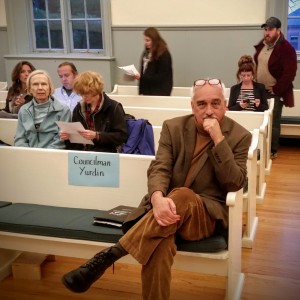
Steve Brown, the executive director of the Rhode Island ACLU has issued a statement regarding Providence City Councillor Kevin Jackson’s lawsuit against the two people, Patricia Kammerer and Karina Holyoak Wood, who have organized a recall effort and petition against him.
Jackson’s lawsuit also names the City of Providence and the Providence Board of Canvassers.
“The ACLU is not familiar enough with the mechanics of the City’s recall mechanism to comment on the specifics of the allegations contained in Councilor Jackson’s complaint,” said Brown in the RI ACLU statement, “We do agree that certain due process standards are essential before subjecting elected officials to the burdens imposed in having to defend themselves against removal from an elected position they obtained through a democratic process.
“At the same time, we are deeply troubled that, in addition to suing City officials and the Board of Canvassers, which is responsible for overseeing the recall petition process, the lawsuit names as defendants the two private individuals who have been involved in mounting this recall campaign. Their involvement in the suit is completely unnecessary in order for a court to address any legitimate due process concerns raised by the petition process. Thus, the inclusion of these two individuals as defendants strikes us a classic SLAPP suit – an attempt to silence private citizens for seeking to exercise their First Amendment right to petition government.
“As Rhode Island’s SLAPP suit statute notes, ‘full participation by persons and organizations and robust discussion of issues of public concern before the legislative, judicial, and administrative bodies and in other public fora are essential to the democratic process.’ These two Providence residents should not be forced to defend themselves in a court of law for exercising petition rights granted them by the City Charter. The ACLU urges Councilor Jackson to amend his complaint and remove these two private citizens as defendants.”
In a statement the Kammerer and Holyoak Wood called Jackson’s lawsuit “an obvious delaying tactic.” Holyoak Wood was the campaign manager of Marcus Mitchell, who ran an unsuccessful write-in campaign against Jackson two years ago.
]]>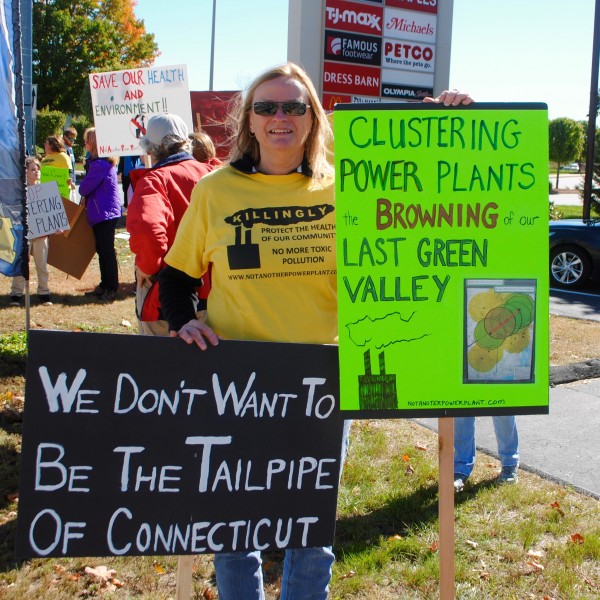 As large as Invenergy‘s $700 million fracked gas and diesel oil burning power plant would be if it were to be actually built in the pristine wilderness of Burrillville, the project is but a small part of a colossal, three-state fracked gas infrastructure project that has been in development for years in the northwest corner of the Rhode Island and beyond. Eight power plants currently litter a 31 mile expanse of pipeline, from Killingly, Connecticut, through Rhode Island, to Medway, Massachusetts. If built, Burrillville would be power plant number nine and Killingly is the proposed site of power plant number ten.
As large as Invenergy‘s $700 million fracked gas and diesel oil burning power plant would be if it were to be actually built in the pristine wilderness of Burrillville, the project is but a small part of a colossal, three-state fracked gas infrastructure project that has been in development for years in the northwest corner of the Rhode Island and beyond. Eight power plants currently litter a 31 mile expanse of pipeline, from Killingly, Connecticut, through Rhode Island, to Medway, Massachusetts. If built, Burrillville would be power plant number nine and Killingly is the proposed site of power plant number ten.
Smaller than the power plant proposed for neighboring Burrillville, the “Killingly Energy Center” is slated to produce 550 MW of unneeded energy. It will produced nearly 2 million tons of emissions per year, adding to the emissions of the Lake Road Generating Facility, an 840 MW power plant already located in Killingly. Emissions, of course, know no political boundaries, so large parts of Rhode Island will be subjected to this increase in pollutants.
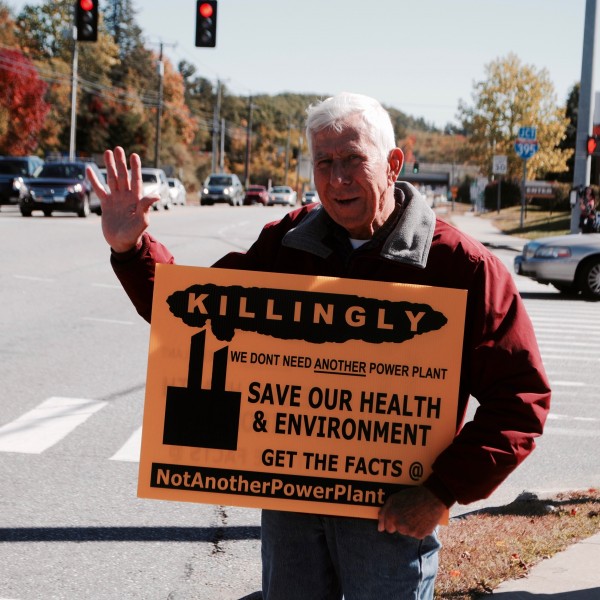 The Killingly power plant is to be built in a residential neighborhood within a mile of 460 Killingly housing units. At least five schools and day cares, over 5,000 students, are within three miles of the proposed plant. Wyndham County, where Killingly is located, has asthma rates 18 percent higher than the rest of Connecticut.
The Killingly power plant is to be built in a residential neighborhood within a mile of 460 Killingly housing units. At least five schools and day cares, over 5,000 students, are within three miles of the proposed plant. Wyndham County, where Killingly is located, has asthma rates 18 percent higher than the rest of Connecticut.
To power the plant, a pipeline connection to the main AIM pipeline will be built, crossing the Quinebaug River, Wyndham Land Trust, the Airline Trail, Pomfret Audubon Society and Bafflin Sanctuary. Each area a precious resource.
Like Burrillville, the proposed power plant needs water. There is a concern that the aquifers will be strained and that residents will suffer a lack of water given that the power plant needs 90,000 gallons a day when burning fracked gas and as much as 400,000 gallons a day when burning diesel oil. Also, like Burrillville, there are safety and and noise issues to consider when a plant like this is built in a residential area.
 The Town of Killingly is categorized as a distressed community. Like other areas where these types of facilities are targeted, there are environmental justice issues to be considered. Very often the facilities are like these are aimed at low income communities that lack the financial means to either fight the power plant or resist the financial carrots dangled by the company building the plant.
The Town of Killingly is categorized as a distressed community. Like other areas where these types of facilities are targeted, there are environmental justice issues to be considered. Very often the facilities are like these are aimed at low income communities that lack the financial means to either fight the power plant or resist the financial carrots dangled by the company building the plant.
NTE Energy, the prospective builder, has never completed a power plant. Formed in 2009 as a private equity funded company, there is a worry that the company will build the plant and sell it off for a quick profit. Currently the company has six power plants in development, two of which are under construction. The company has no experience in operating or maintaining a power plant.
Also, like in Rhode Island, the residents most impacted by the siting of a power plant in their community have no say in whether or not the plant will be built. The Connecticut Siting Council, the equivalent of Rhode Island’s Energy Facility Siting Board (EFSB) makes the final decision regarding the power plant in Killingly. The Siting Council has already determined that Connecticut has an excess of electricity generation into 2020, yet is still considering the power plant in Killingly.
Opposition to the power plant has begun in Killingly. The group is called Not Another Power Plant, and I found that they were very knowledgeable about the situation in Burrillville. I went there Monday afternoon to talk with residents who were holding signs and a press conference to get the word out. Below I speak to Connecticut State Senator Mae Flexer and Connecticut State Representative Danny Rovero about their opposition.
On Thursday October 20th beginning at 3:30 pm there will be a public field review of the proposed NTE/KEC site on Lake Road, Dayville. This will be an opportunity to see the area where NTE hopes to build the power plant. Afterwards there will be a Public Hearing with the Connecticut Siting Council at 6:30 pm at the Killingly High School Auditorium. Public comment will be heard at this meeting.

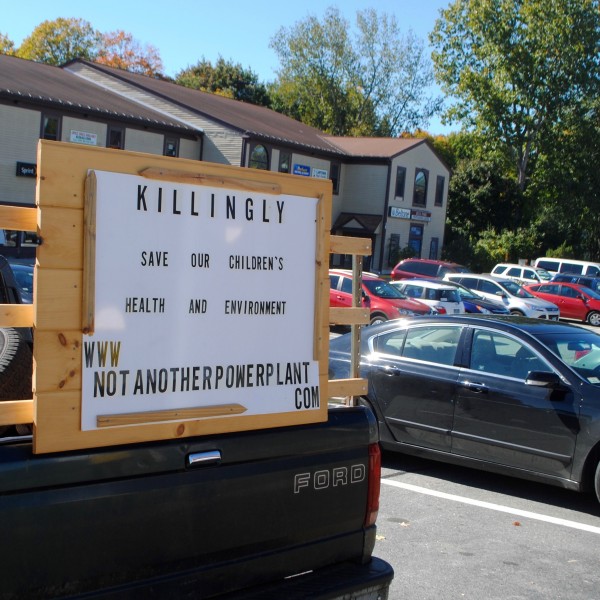
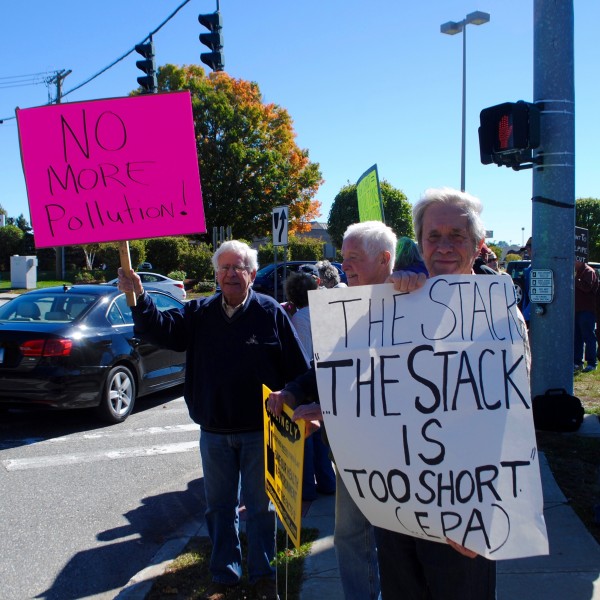
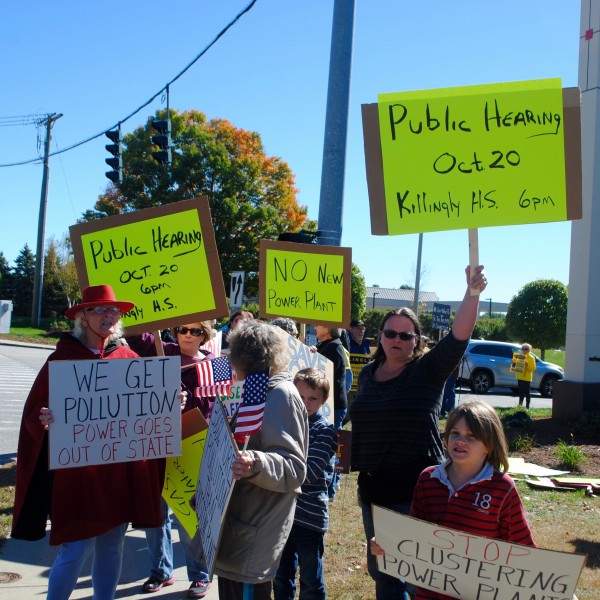
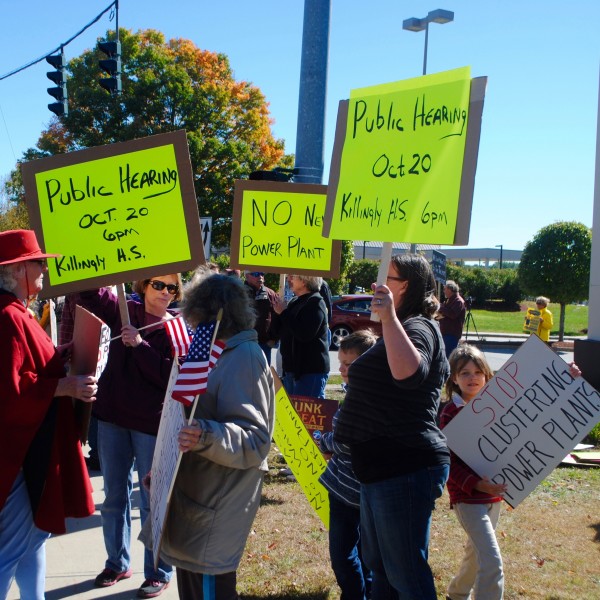
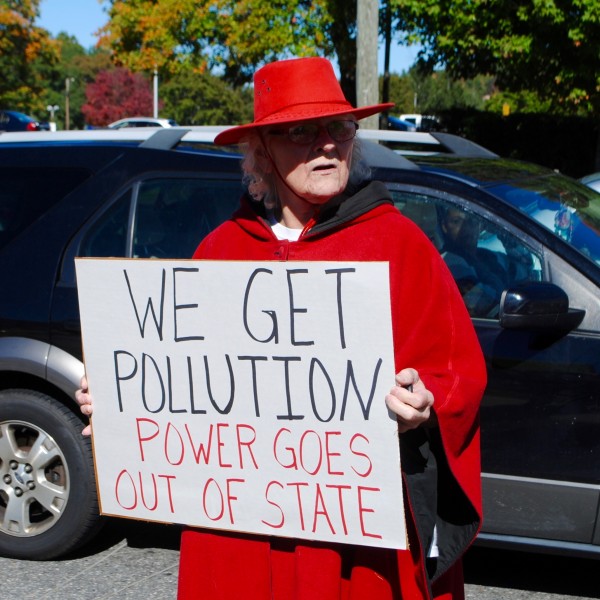
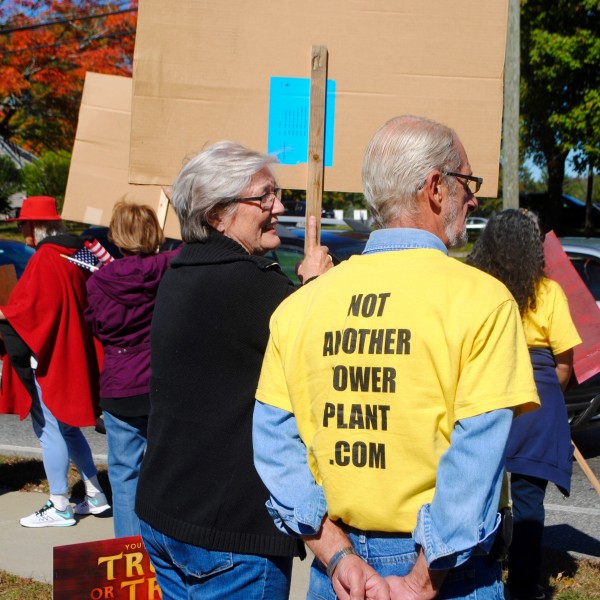
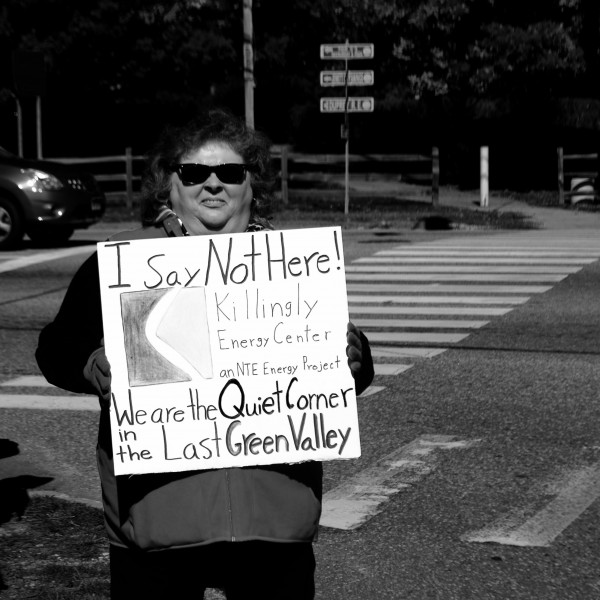
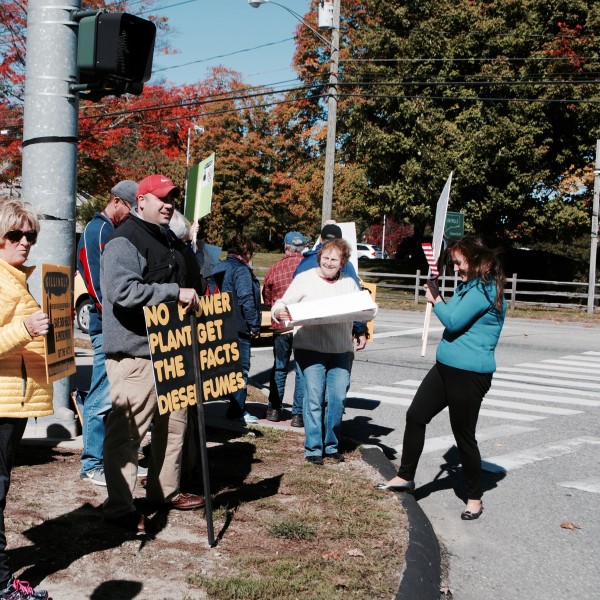
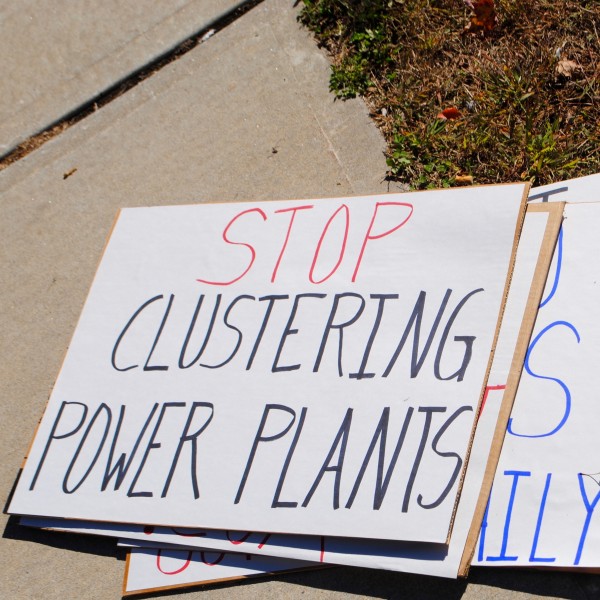

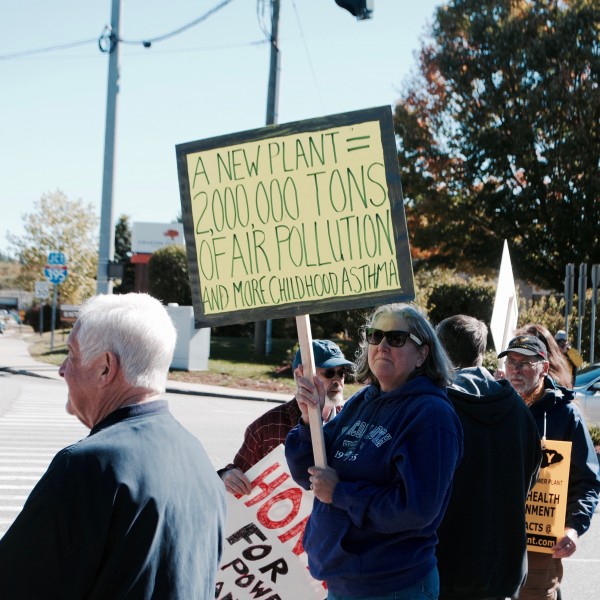
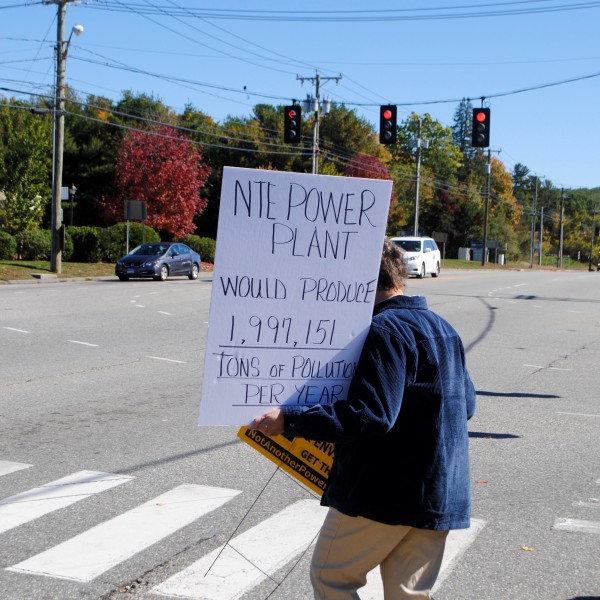
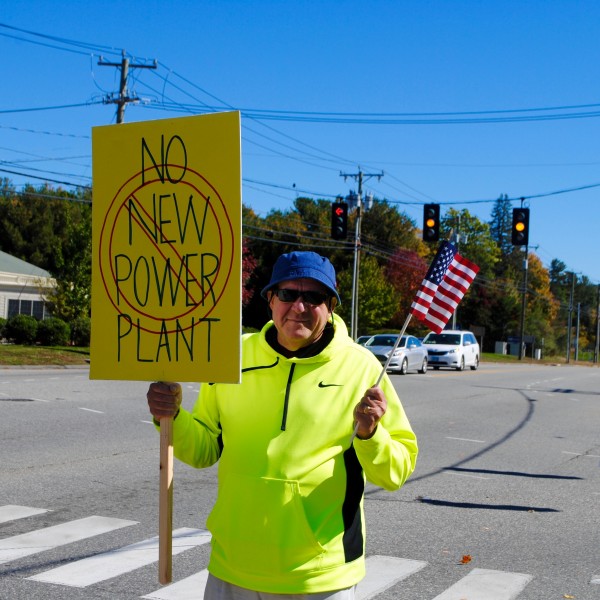
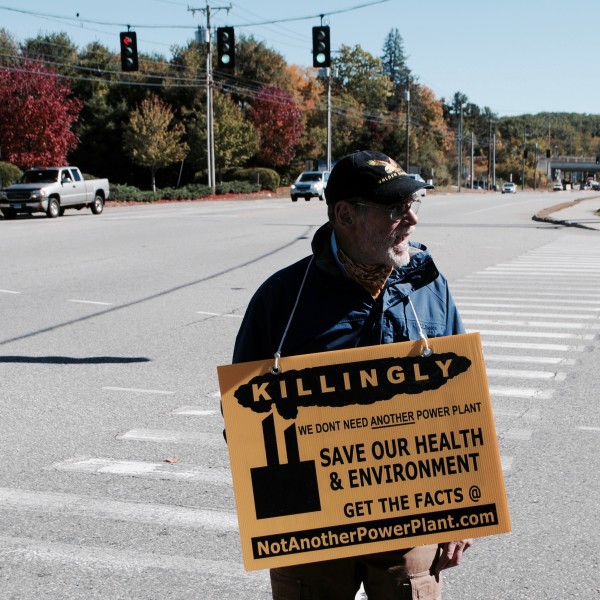

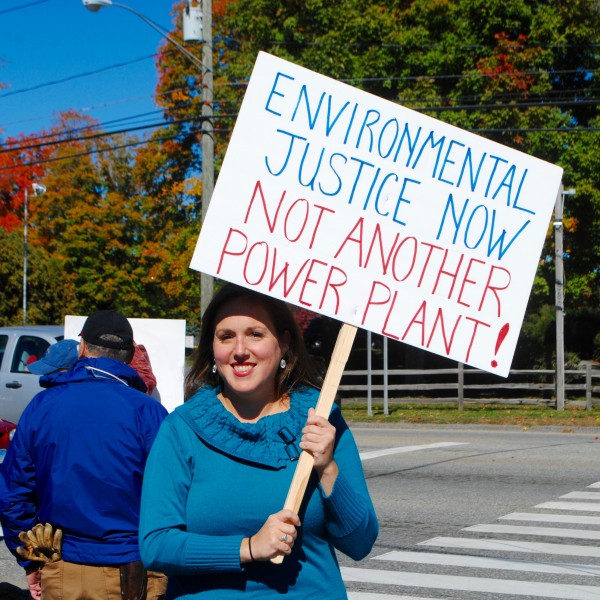

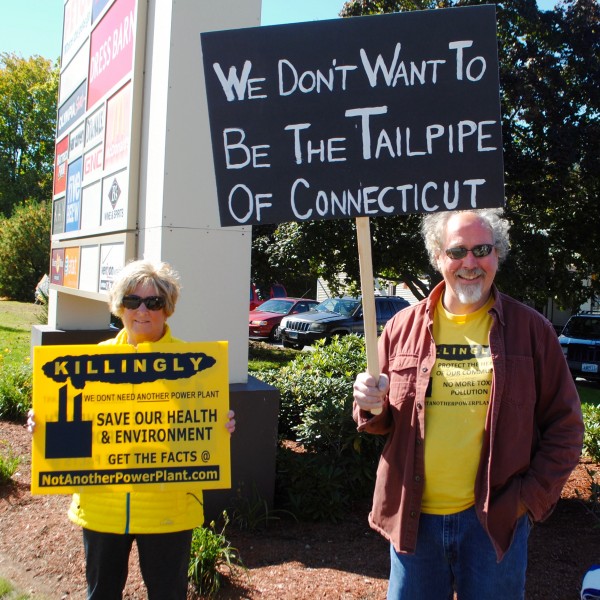
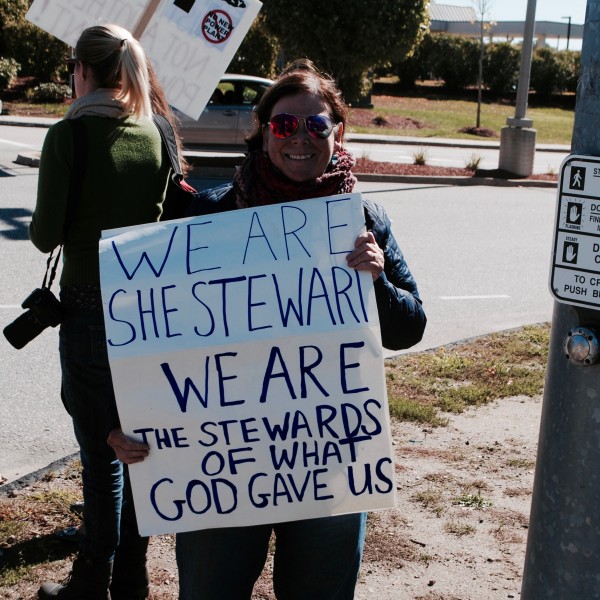
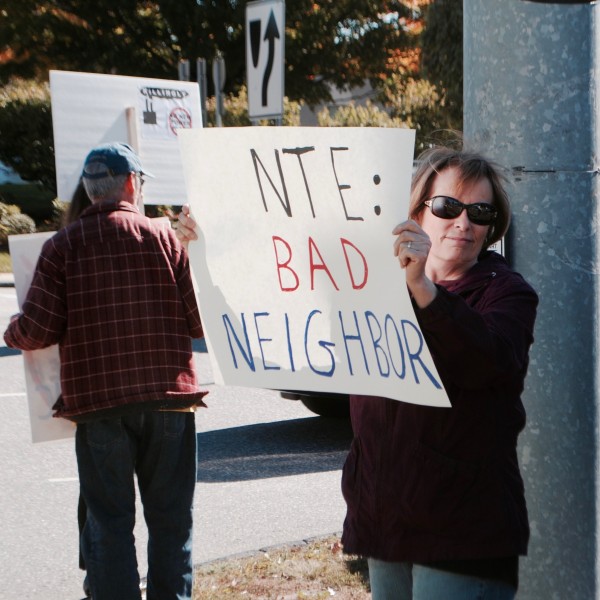
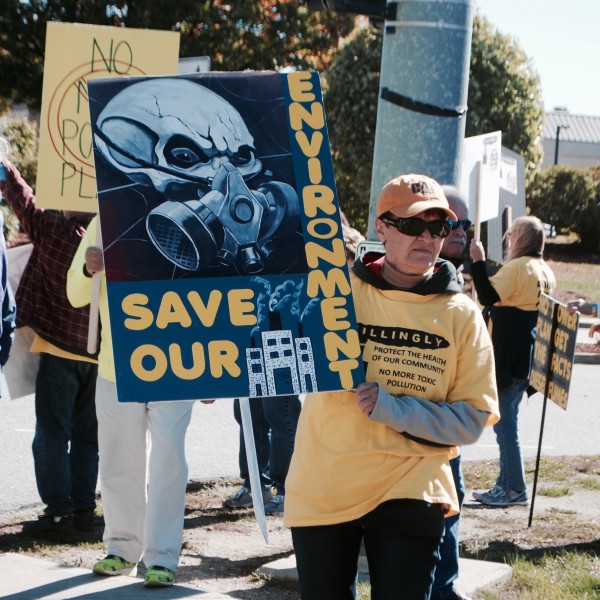
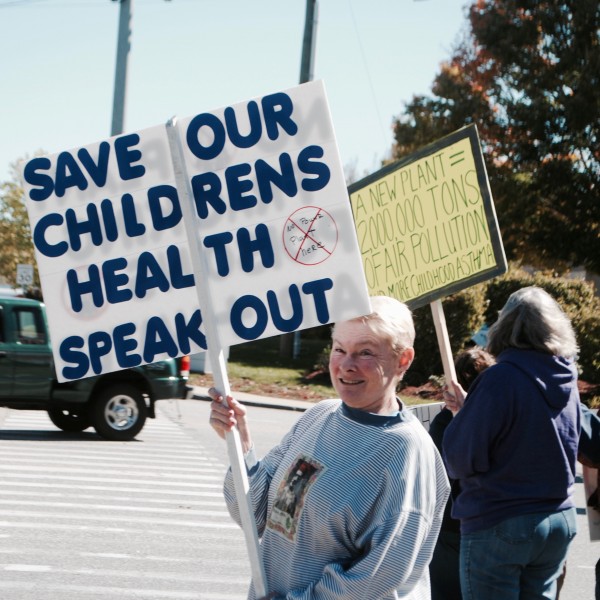
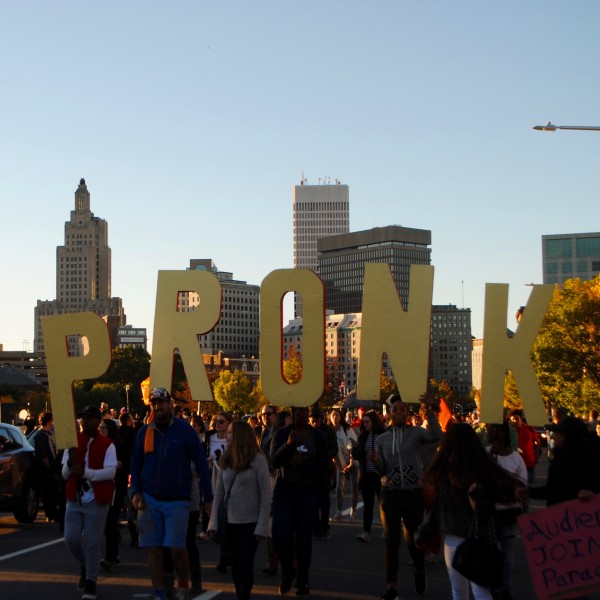 For its 9th Annual Festival PRONK! partnered with the STEP UP Coalition to support to the Community Safety Act (CSA). The goal of the collaboration was “to use music, dance and art to bring attention to injustices and inequalities in our city and encourage people across Providence to stand behind the legislation.”
For its 9th Annual Festival PRONK! partnered with the STEP UP Coalition to support to the Community Safety Act (CSA). The goal of the collaboration was “to use music, dance and art to bring attention to injustices and inequalities in our city and encourage people across Providence to stand behind the legislation.”
The STEP UP Coalition is made up of the Providence Youth Student Movement (PrYSM), Direct Action for Rights and Equality (DARE), American Friends Service Committee (AFSC), Olneyville Neighborhood Association (ONA) and various other activist groups in Providence. The CSA is a citizen-proposed ordinance that would address racial profiling and other abuses of power by police. Mayor Jorge Elorza recently said the CSA could pass before the end of the year.
This is the ninth year for PRONK! (Providence HONK!) which takes place every Indigenous People’s Day. It is not a Columbus Day parade. Local bands, such as the Extraordinary Rendition Band, What Cheer? Brigade, and Kickin’ Brass participated, as well as bands from around the country. Organizers describe PRONK! as “a cacophonous street celebration with out of town brass bands! We are a street intervention like no other, with outfits and misfits from Rhode Island and beyond – musicians, artists, activists, makers – taking over the streets as part of the Providence HONK Parade.”
Organizers go on to say that PRONK! “spawned from the original HONK! Festival in Somerville, MA that has “grown into a new type of street band movement—throughout the country and across the globe—outrageous and inclusive, brass and brash, percussive and persuasive, reclaiming public space with a sound that is in your face and out of this world.”
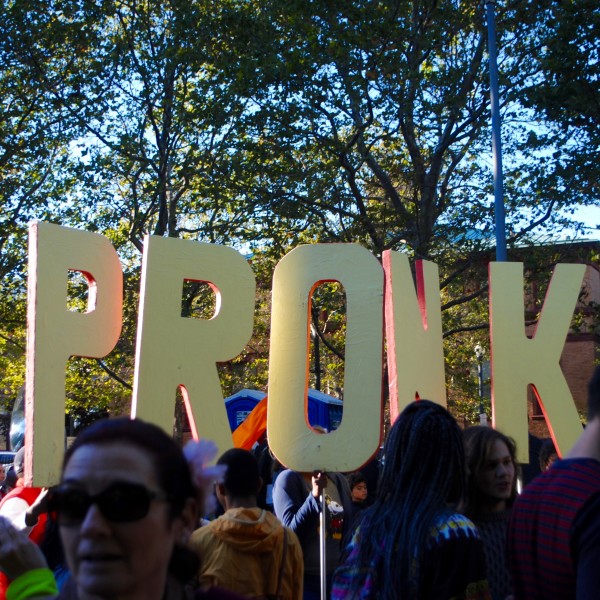
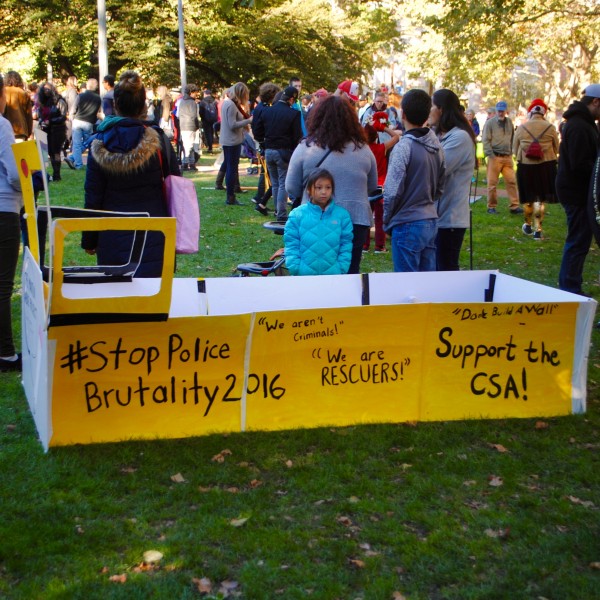
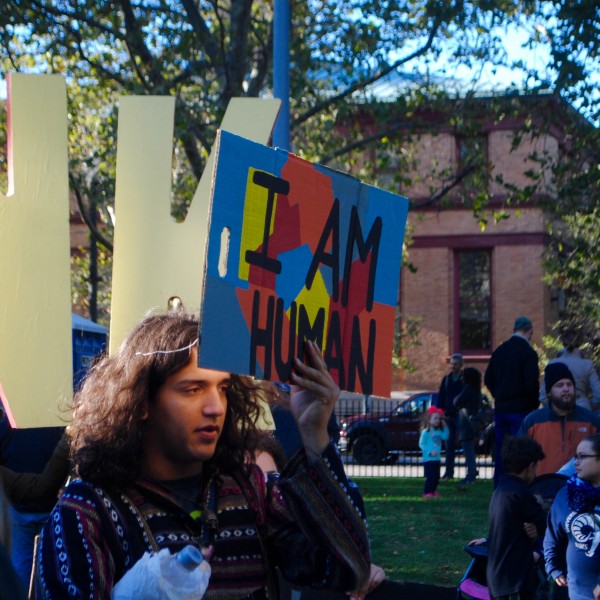


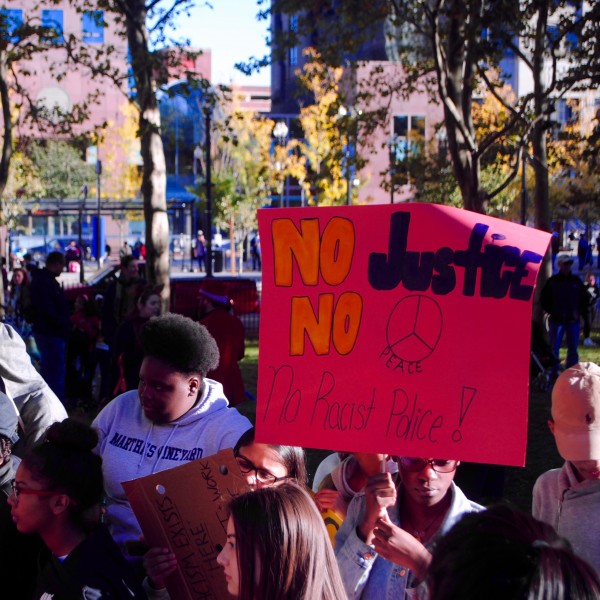










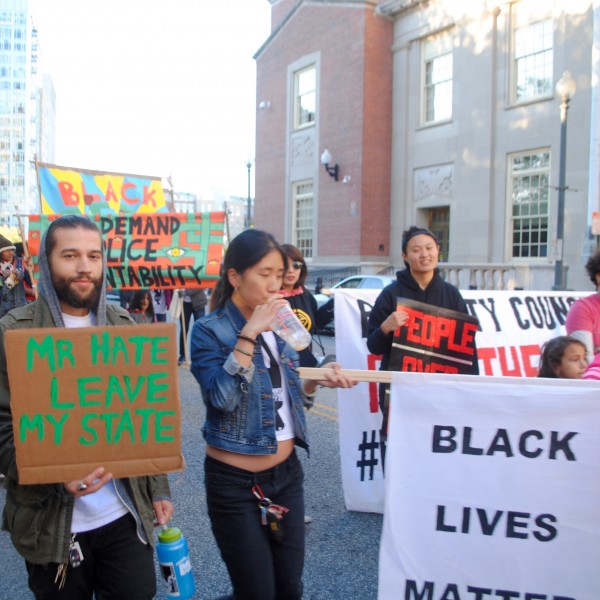

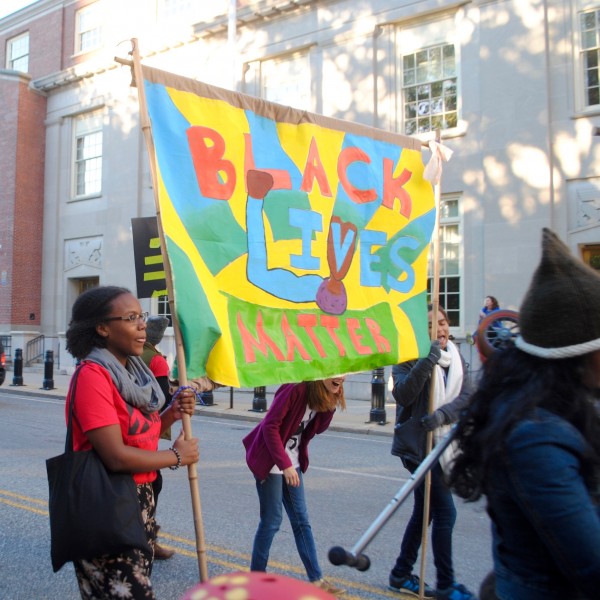
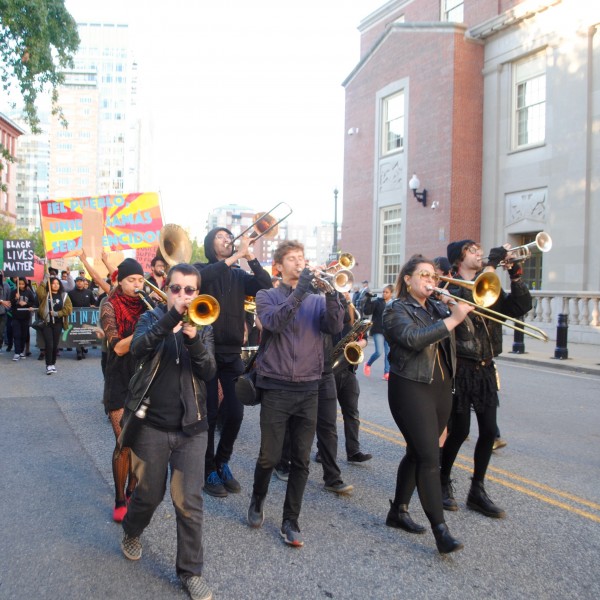

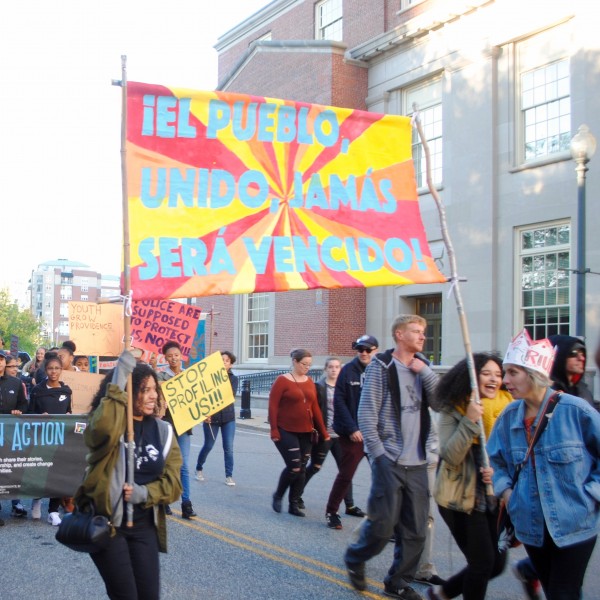
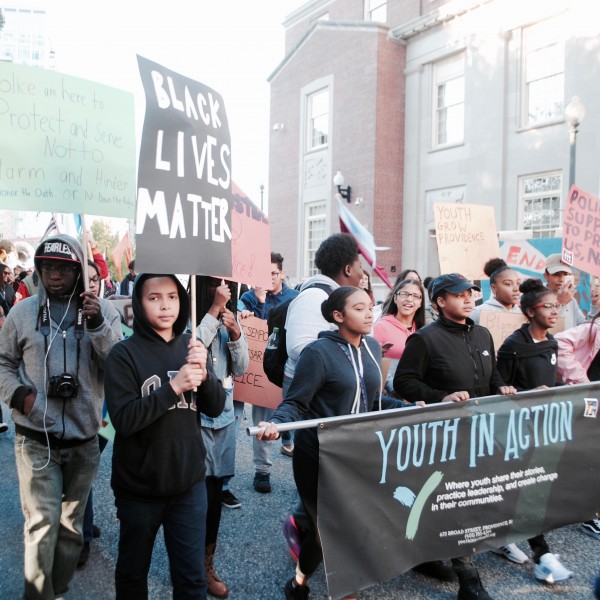
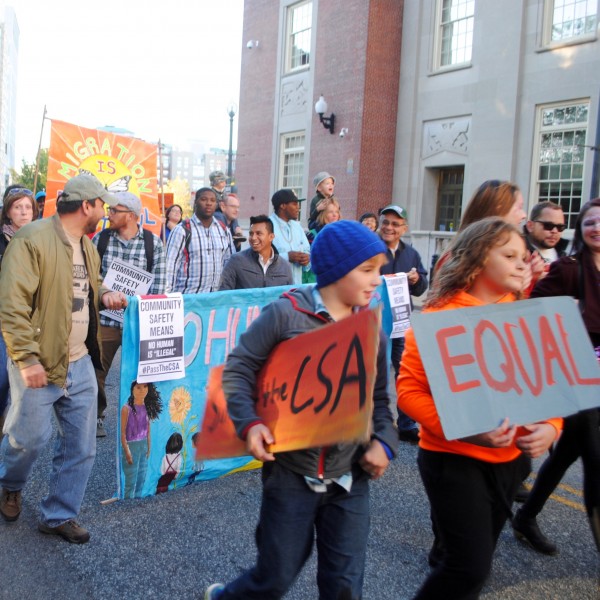
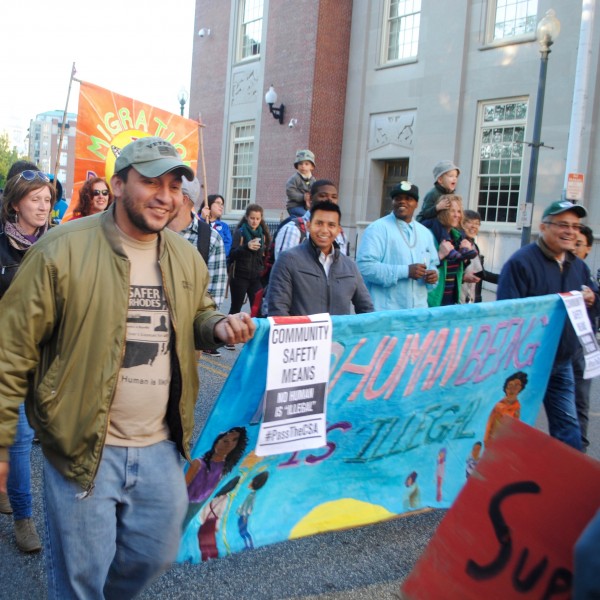
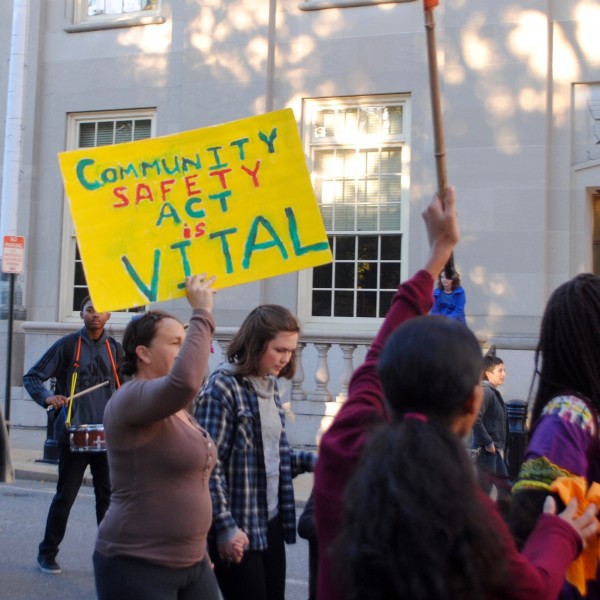






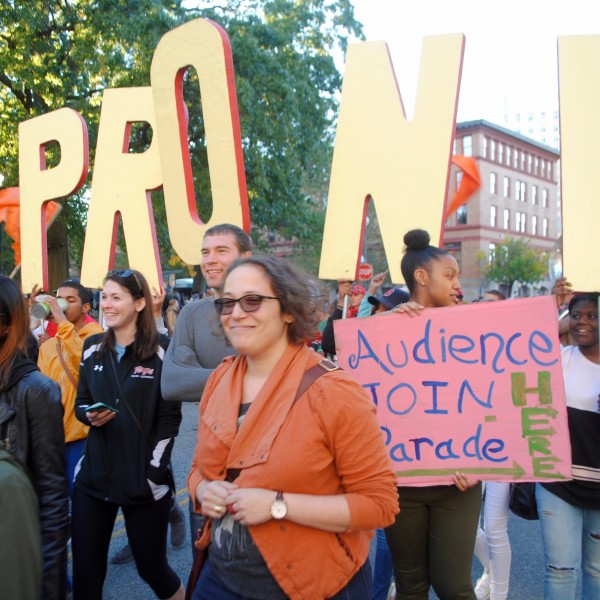

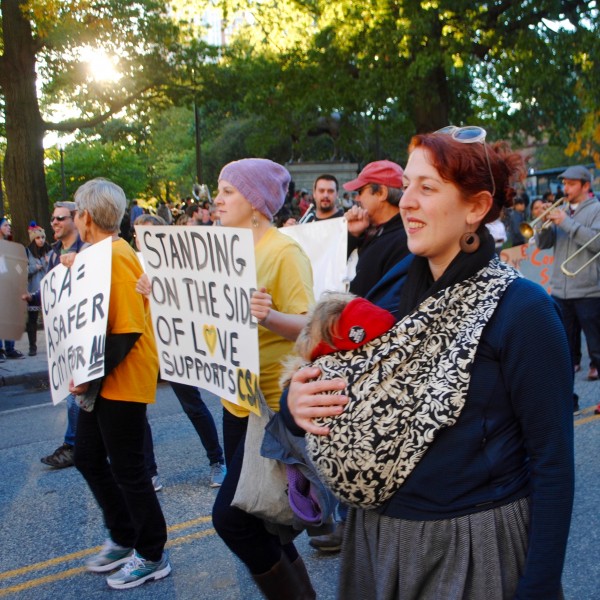


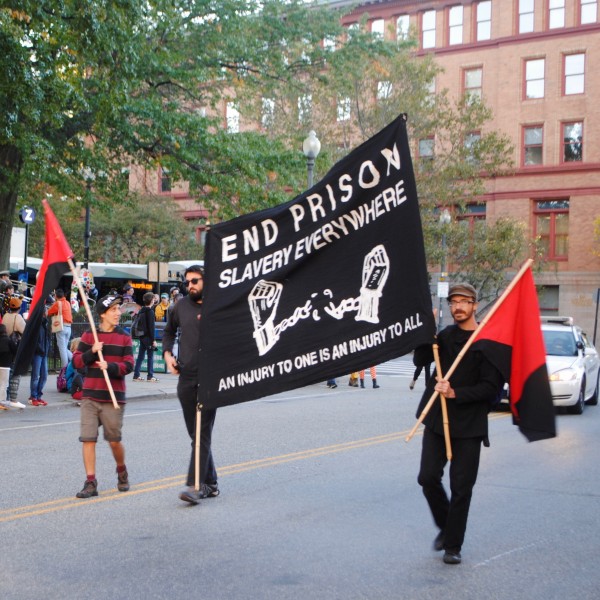
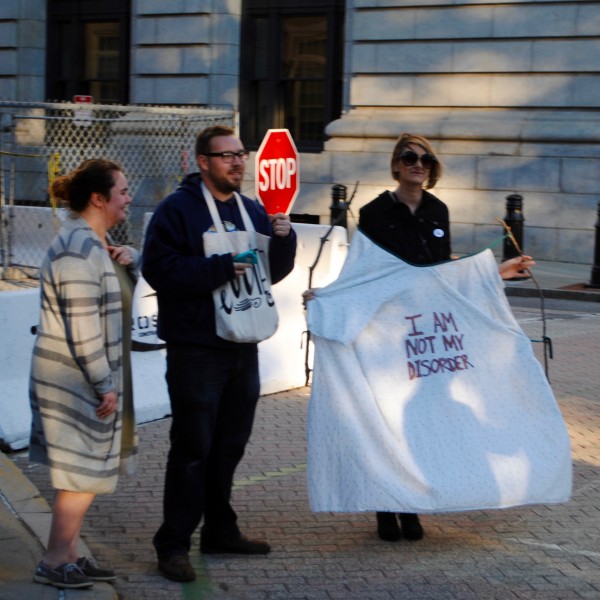



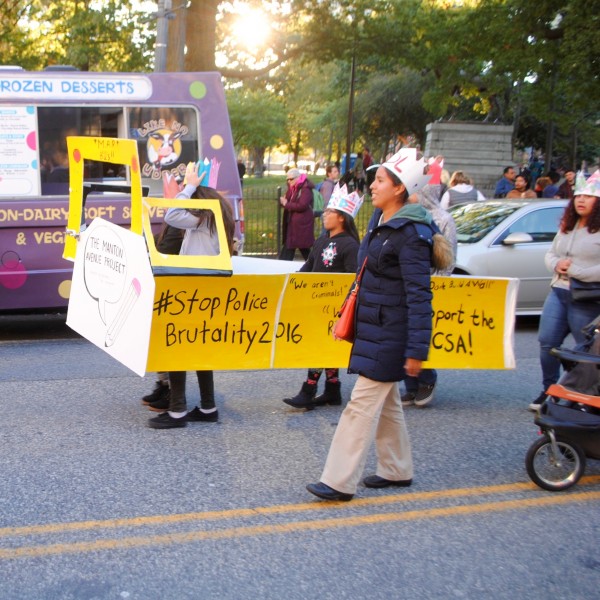

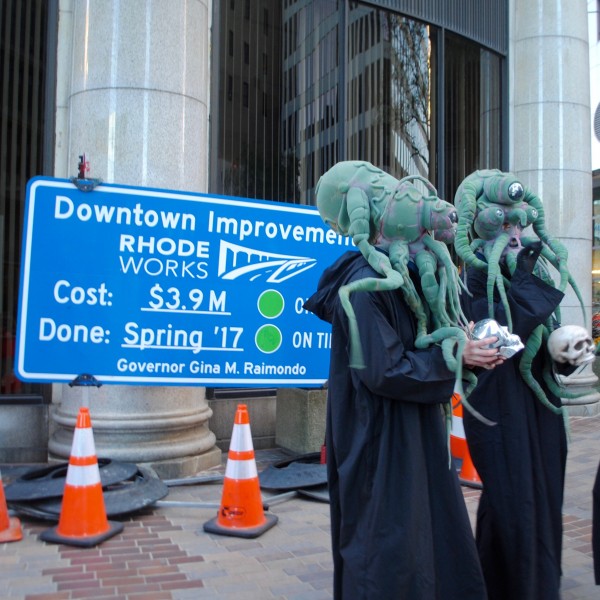
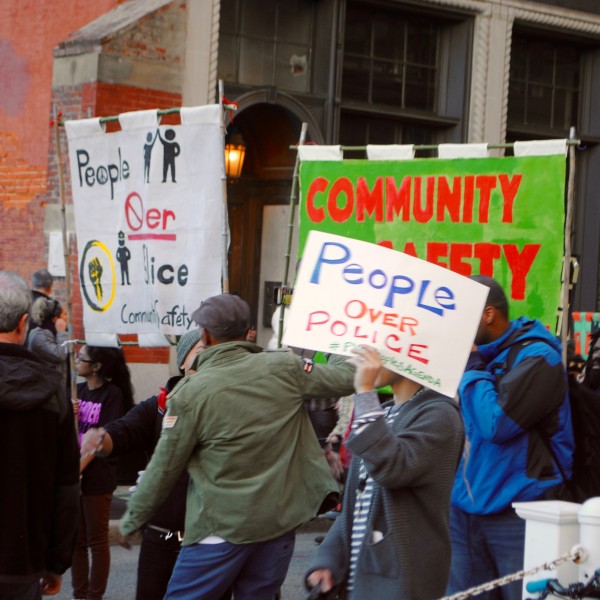
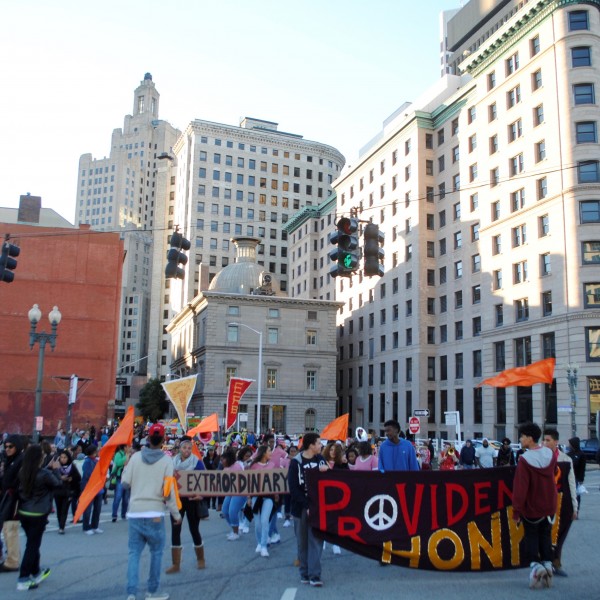


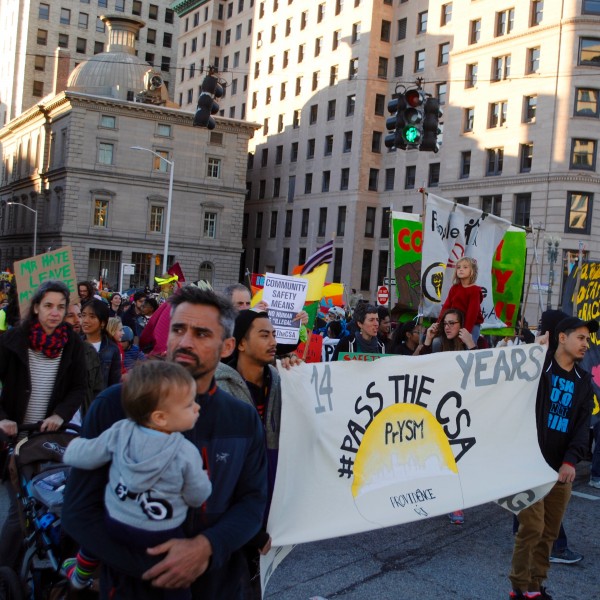


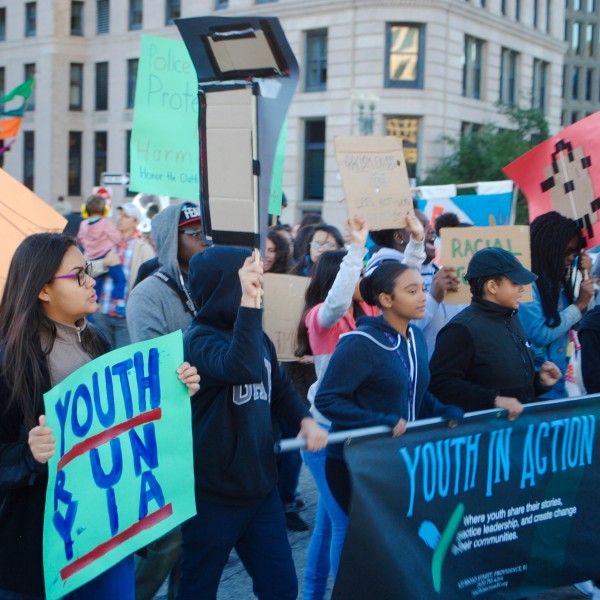






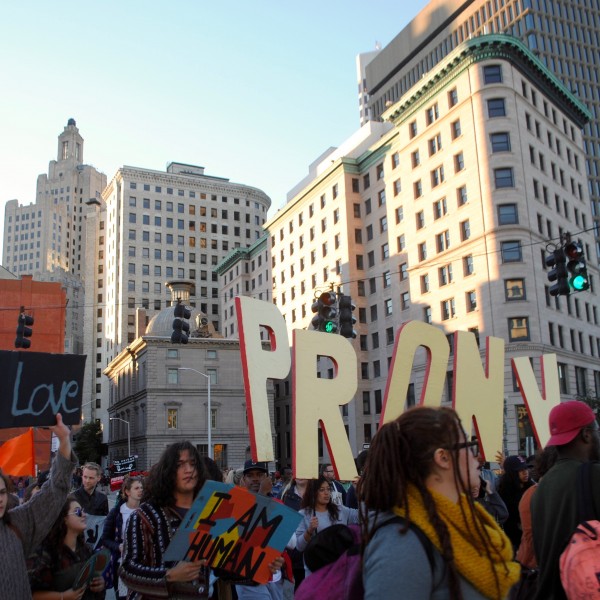
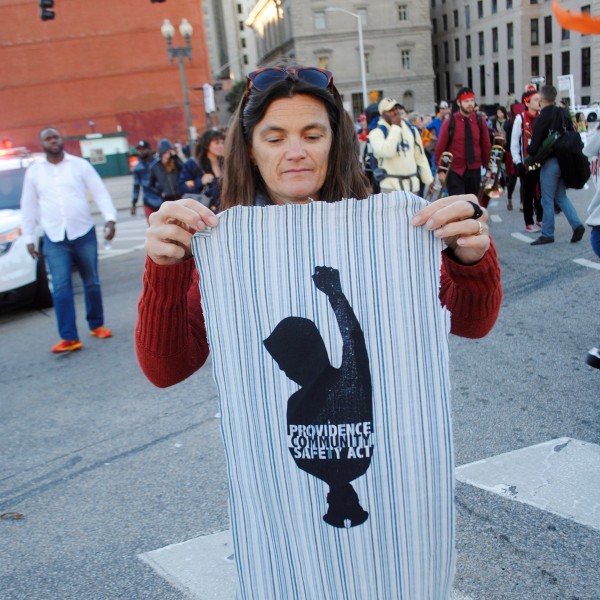
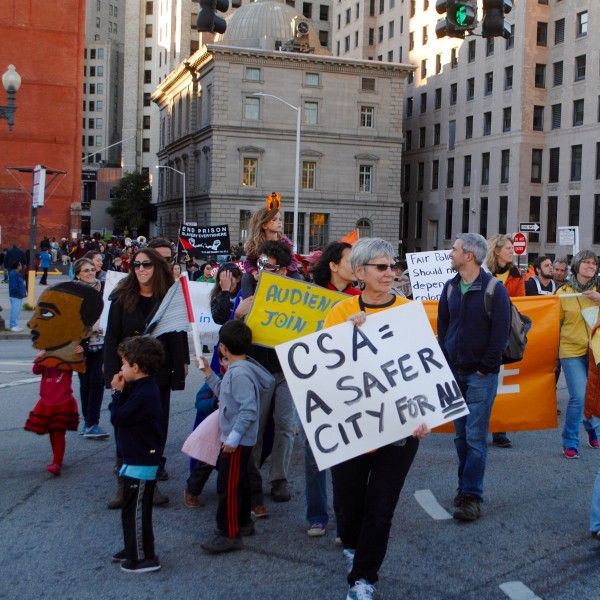
















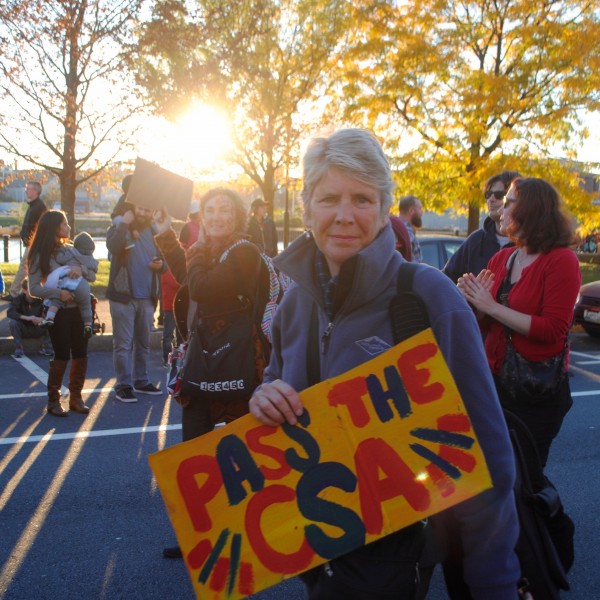

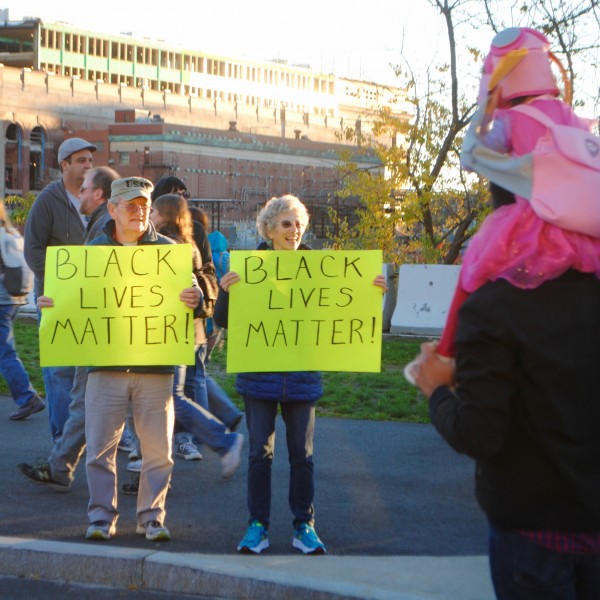
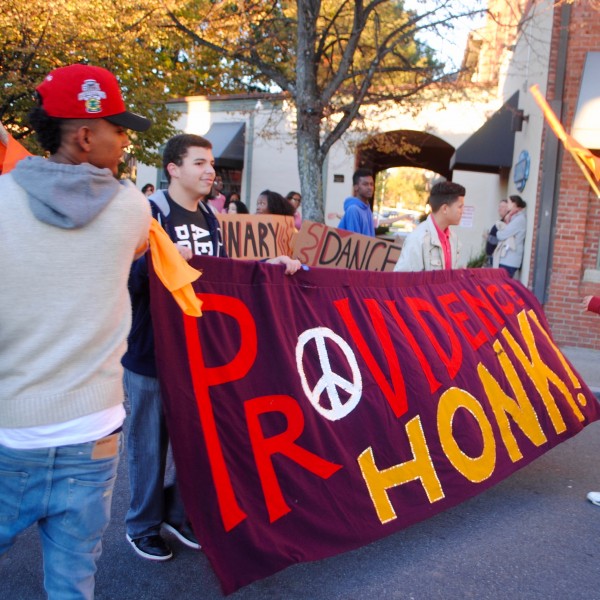
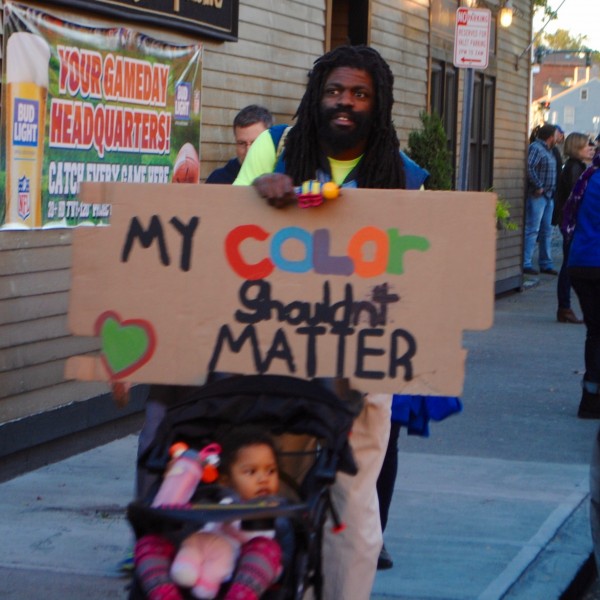
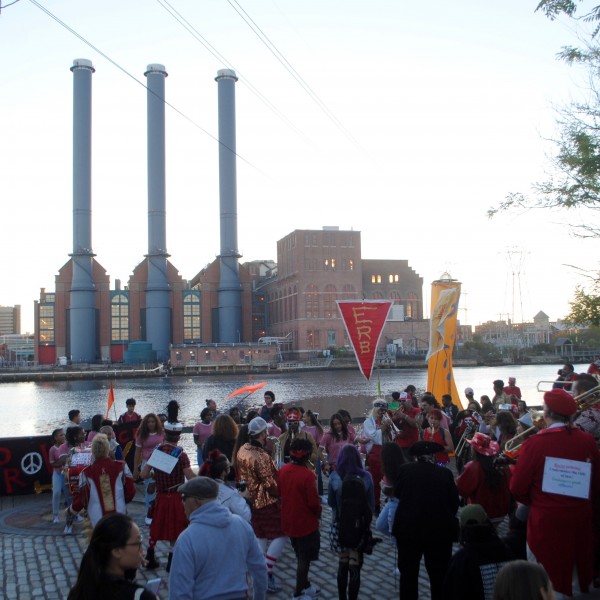
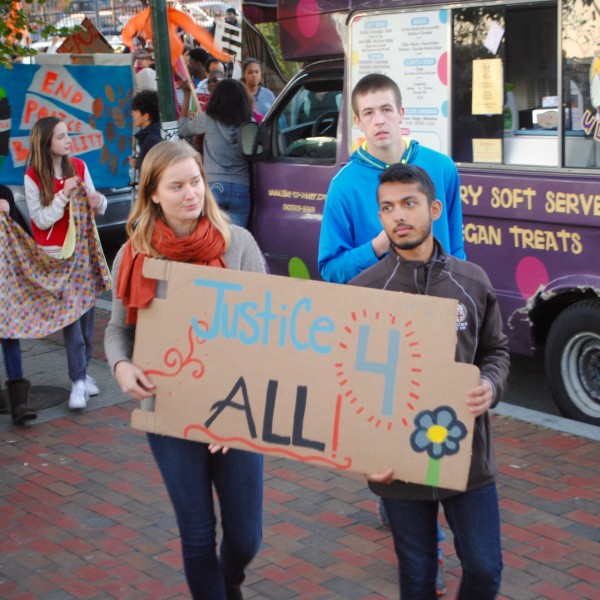
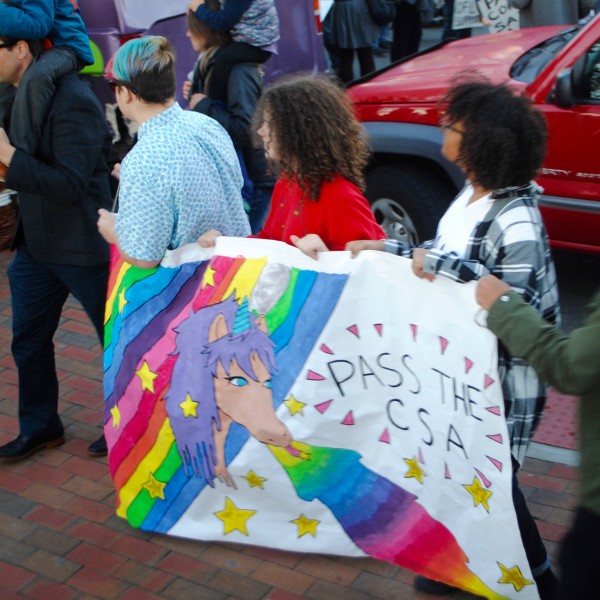

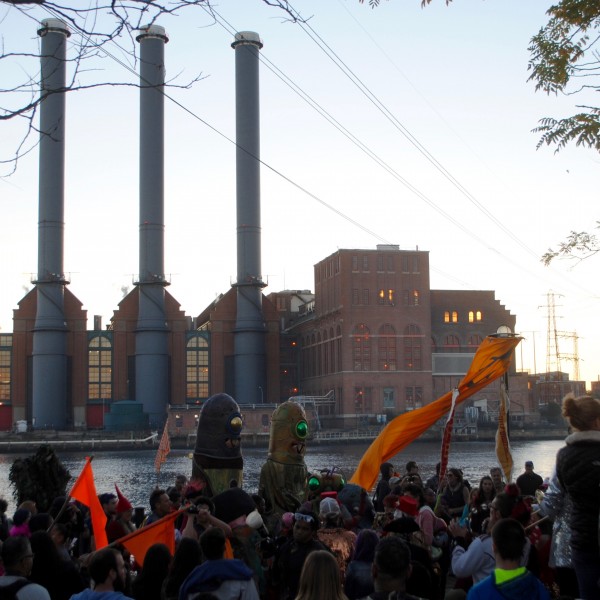




 Catholics for Choice has released a new poll that “the story of what Catholic opinions might mean at the voting booth come November 8.” According to the polling data, 46 percent of Catholic voters support Democratic candidate Hillary Clinton, and 40 percent support Republican candidate Donald Trump.
Catholics for Choice has released a new poll that “the story of what Catholic opinions might mean at the voting booth come November 8.” According to the polling data, 46 percent of Catholic voters support Democratic candidate Hillary Clinton, and 40 percent support Republican candidate Donald Trump.
Key findings include:
- Latinos, Catholic women and Catholic millennials show the largest support for Clinton over Trump.
- Sixty percent of Catholic voters say that the views of the Catholic hierarchy are not important to them when they are deciding who to vote for in the presidential election.
- Six in ten Catholic voters do not feel an obligation to vote the way the bishops recommend.
- Sixty percent of Catholic voters say that abortion can be a moral choice.
- Seventy-two percent believe that abortion should be available to pregnant women who have contracted the Zika virus.
- Seventy percent of Catholics do not think that companies should be allowed to use the owner’s religious beliefs as a reason to deny services to a customer or employee.
Jon O’Brien, president of Catholics for Choice said, “The Catholic vote is like a jump ball in basketball—every election it comes into play and both parties try to claim it as their own. As it represents 25 percent of the electorate, considerable effort goes into trying to determine which team will grab it. However, as this new poll shows what we’ve always known: Catholics are concerned with social justice and compassion and do not vote with the bishops, no matter how much the bishops try to project their own beliefs onto this section of the electorate.”
The poll was conducted before the vice presidential debate between Democrat Tim Kaine and Republican Mike Pence, where the two squared off on religious liberty and abortion, but in a statement released after the debate Catholics for Choice said, “Catholics act according to their own conscience and they do not stand with the Catholic hierarchy on abortion, access to healthcare or the rise of religious refusals backed by the bishops, and similarly do not think they nor Catholic politicians have an obligation to vote according to the Bishops. In fact, Senator Tim Kaine said it was not the role of a public servant to mandate their faith through government, and on fundamental issues of morality, like abortion, we should let women make those decisions.”
Rhode Island is routinely said to be the most Catholic of the United States.
]]>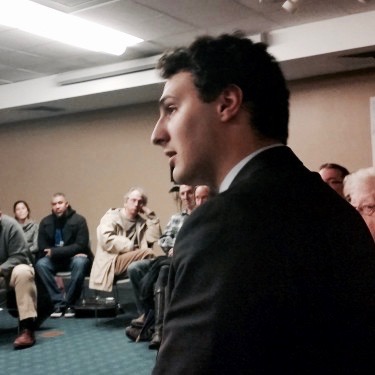
How many Rhode Island inmates are put in solitary confinement? Why are they there? How long do they stay? “And what do they actually look like,” asked Providence Rep. Aaron Regunberg, chair of a new state commission that will answer these and other important questions about the use of solitary confinement at the ACI.
The new commission met for the first time Thursday, and hopes to answer some of those questions at its next meeting on October 20. From there, the commission plans to take a hard look at psychological effects on inmates, public safety effects on society and fiscal impacts on the state budget.
“Is there room for improvement in how we do things, and if so where” asked Regunberg, “Again I want to stress that as a body we’re not starting out with assumptions. We might find out that everything is as reasonably good as it can be … we might find out there are particular rooms for improvement. We’re going to figure that out as we move forward.”
There seemed to be broad agreement on the commission – comprised of prison and prison guard officials, mental health experts and criminal justice advocates and three legislators – that so-called solitary confinement was something worth studying.
“It goes by a number of different names,” said ACI Director AT Wall, a member of the new commission. “We tend to call it restrictive housing. Restrictive housing has emerged as an issue across the country, an issue in inmate management and it’s one that we think we have to take a look at and we are here in a spirit of collaboration to do just that.”
Even Richard Ferruccio, president of the Rhode Island Brotherhood of Corrections Officers, which expressed strong reservations about reforming solitary confinement practices at legislative hearings last year, was hopeful the commission would prove productive.
“I’m looking forward to seeing what we can do to improve our system,” he said. “I think we already have one the better run systems in the country but if we have an opportunity for improvement or ideas, that’s something we’re always looking forward to.”
Mental health advocates said there are “necessary changes” needed in how the ACI uses solitary confinement.
“I’m very happy that all of these people have convened to make these necessary changes,” said Meg Clingham, director of state Office of Mental Health Advocate. “Many of my clients that are criminally involved and at the ACI find themselves in segregation because they are unable to comport their behavior due to their mental illness so I think it’s really great that we are looking for solutions to this problem.”
This was the first of at least six meetings before the commission offers possible recommendations.
The commission’s mandate from the legislature (H8206) includes a preference for administrative rather than legislative reforms. “There are important stakeholders who have expressed a strong preference for administrative over legislative reform,” according to a power point presentation shown at the commission’s first meeting. “As such, if the commission determines there is room for improvement, our first goal is to identify a set of recommendations that can be implemented administratively.”
]]>
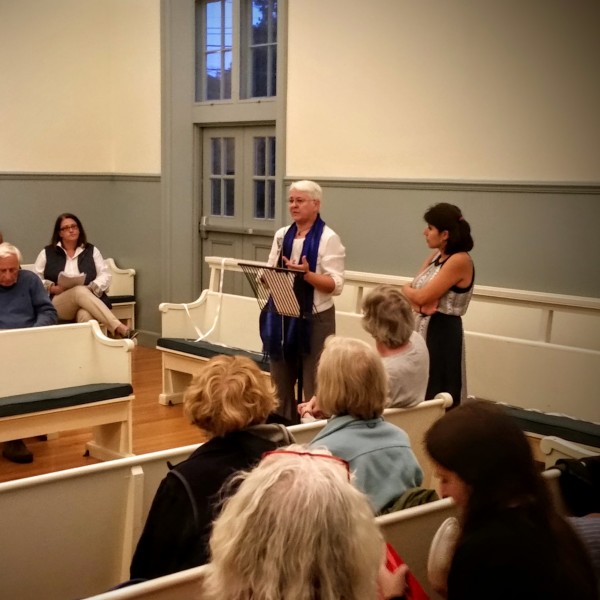
Providence Mayor Jorge Elorza attended an East Side forum on the Community Safety Act (CSA), saying that despite some differences, he doesn’t “think it will be a problem getting this done before the end of the year.”
East Side City Councillors Kevin Jackson and Sam Zurier were in attendance. Councillor Seth Yurdin was out of town. While Jackson is fully in support of the CSA, Zurier and Yurdin have both publicly registered doubts.
After Elorza heard the speakers below, he spoke about his own encounters with the police, due to racial profiling. Though in broad agreement with the CSA, Elorza did outline some points of disagreement, including issues around the use of canines in policing, requesting proof of ID from juveniles, a prohibition against photographing juveniles, the eradication of the gang identification database and concerns that a “community safety review board” clashes with the police officers bill of rights.
On the gang database, Elorza believes that there will be a way to make the process more open, so that people will be able to have some measure of oversight. He also feels that there may be ways to craft policies that will satisfy both sides of the issue.
“There are many more places where there is agreement than disagreement,” said Elorza, “and on the areas where there are disagreements, I still remain very hopeful.”
There was little doubt that the community members in attendance were squarely behind the CSA. Nine residents spoke passionately about the need for expanded oversight of the police. Resident Don Baier told a very personal story of when he called the police to help find his sister, who was roaming the streets, delusional. Because of the excellent work of the police, his sister was recovered unharmed and received treatment. Not everybody has such positive interactions with the police, said Baier. He wishes that “every neighborhood could get the same kind of swift, thoughtful action” from the police.
Resident Maureen Reddy is a white East Side resident with a black husband and children, and she is afraid to call the police, for fear that her family might be imperiled. “Both of my children have been hassled by police, repeatedly,” said Reddy. Her son simply assumed that when he left the house, he would be stopped by the police and asked to explain himself. Her daughter was stopped on Benefit St by officers with guns drawn. Had it been her son in that position, she fears he would be dead.
Once a man pulled into Reddy’s driveway and asked her to call the police. Before she did so, she made sure to tell her husband to wait inside the house, so he wouldn’t be a target when the police arrived. Another time, when a woman was yelling in the middle of the night, Reddy did not call the police. Her husband and other neighbors went outside to assist the woman, but before the police arrived, her husband went back into the house. Again, he did not want to be a target of police suspicion, simply because he was black.
Julia Carson is the Principal of Central High School in Providence and an East Side resident. “I am heartbroken when I am ordered, by police officers, to clear the plaza [at Central High school], ‘get the trouble out.’ I don’t know about any of you, but high school was my safe haven growing up. We used to hang out every day after school and I don’t understand why my kids can’t do the same thing.”
Criminal Justice Attorney Annie Voss-Altman cited research that shows that non-whites are more likely to experience the use of non-deadly force in their encounters with police. “Subject compliance didn’t matter,” said Voss-Altman, “across the board, you’re fifty percent more likely to experience the use of force in your encounter with the police is you are black or Hispanic than if you are white or Asian.”
East Side resident Doug Best made the financial case for the CSA. “…the cost of paying settlements for police misconduct,” said Best, is “our major contributor to poor ROI [return on investment].” In other words, when the police mess up, it costs the city money to settle cases.
East Side resident Mark Santow is an American historian provided a historical context for the CSA. Present policing policies in communities of color drive resentment towards the police, said Santow, “and resentment can prevent the type of effective policing needed to keep communities safe and officers safe.”
Libby Edgerly highlighted the positive efforts the Providence Police department has made in addressing some of the concerns presented this evening. Including Mayor Elorza’s recent announcements regarding plans to address concerns about homelessness downtown. “Other notable recent police department initiatives,” said Edgerly, “include requiring police to use department phones, not personal phones, when videoing non-violent demonstrators. Also, supporting a youth basketball group. Also, instituting additional police training on how to work with people suffering mental health disturbances and, finally, choosing not to purchase military equipment offered by the federal government to police departments nationwide.”
The last item generated appreciative applause.
Ondine Sniffin is a resident of the East Side, a Latina, “and I’ve been arrested at a traffic stop… I learned that even though I’m an educated, English speaking U.S. citizen, I can still be mistreated, solely on account of my gender and/or ethnicity.”
East Side resident Sarah Morenon said that having theses practices established as policies is not enough. Policies change and are enforced at the whims of whoever is in charge. “My concern,” said Morenon, “is codifying the desired practices, to put into writing the police behavior guidelines, and get them into law… where subjectivity will not play such a major part.”
“I would like to see the city policy about non-compliance with ICE holds codified,” said Morenon, right ow the policy is “an informal directive.”
Councillor Sam Zurier expressed some doubts about the CSA, and talked about legislation he plans to introduce as a kind of a “stop-gap” measure.
Councillor Kevin Jackson has black sons, and he’s been a stalwart supporter of the CSA.
Moderator Wendy Becker
Martha Yager of the AFSC helped organize the event.
Vanessa Flores-Maldonado is the CSA coordinator.
Elorza’s support for the CSA was clear. Zurier may need more convincing, and Seth Yurdin’s present opinion is unknown.
